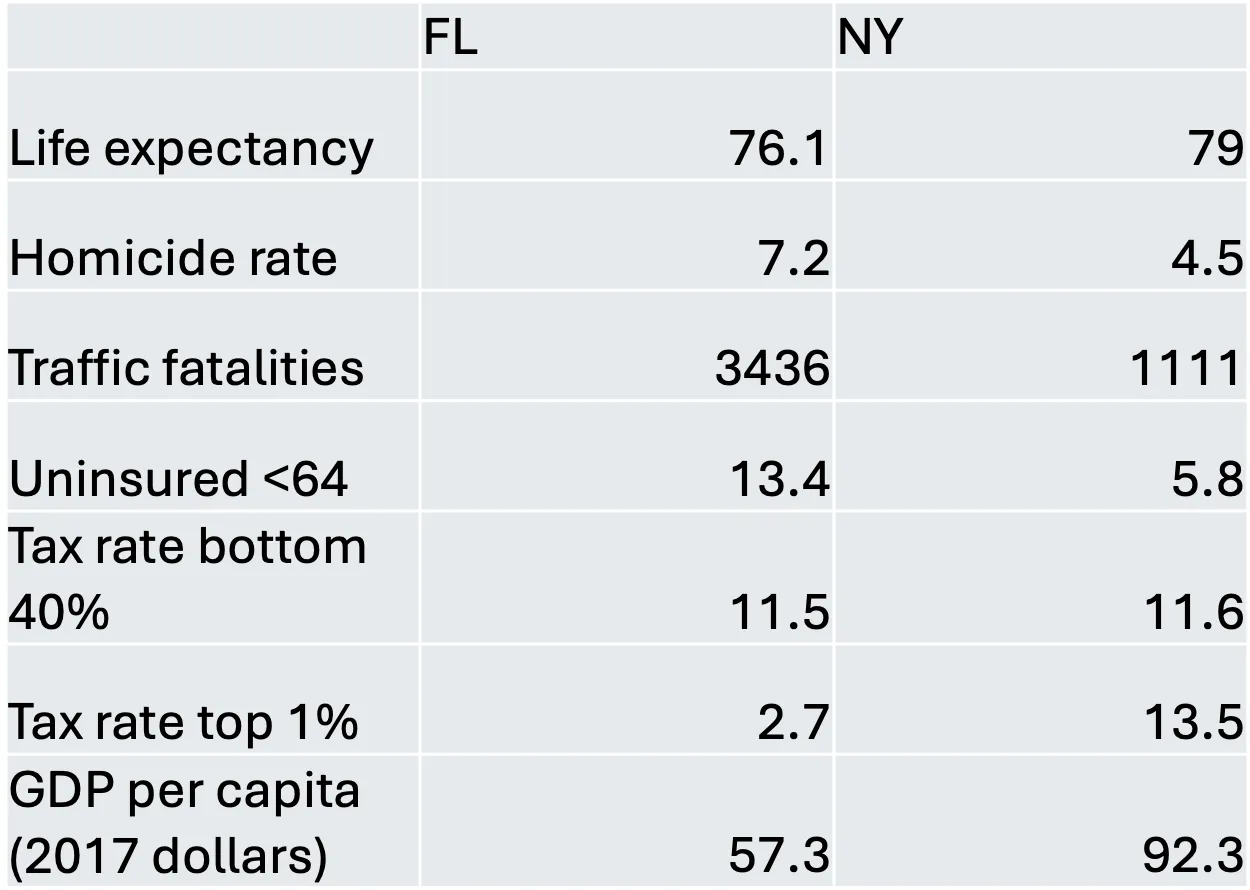- Paul Krugman on MAGA hate on New York, and the reality;
- Beware “whataboutism,” which is easy and wrong;
- Long New Yorker piece about a reactionary blogger’s call for an American monarchy.
Let’s see…. is it fair to say that conservatives in general, and MAGA types in particular, are more given to stereotypes, especially mean-spirited ones about how awful other people and other places are, than more enlightened people? That’s certainly consistent with simple-minded black-and-white thinking.
Somebody said recently that the US should be more like Florida and less like New York. This is someone in the MAGA-inspired Trump administration, of course, where MAGA seems to define itself by what it hates.

Paul Krugman, 2 Jun 2025: Hating New York, subtitled “What we can learn from a MAGA obsession”
MAGA and MAGA-adjacent types are very good at finding things and people to hate. They hate immigrants (unless they’re white South Africans), LGBTQ people and wokeness. They hate universities and are doing their best to destroy American science. The New York Times reports that they hate Europe. And they very much hate New York City.
OK, I’m not impartial on this issue. I grew up on Long Island and still think of NYC proper as “the city.” I live in Manhattan now, and my experience is that if you can afford housing — which is admittedly a huge problem — it’s actually a very good life, with an incredible range of things to do either in walking distance or a short subway ride away. Not everyone wants to live this way, but nobody is saying they should. All we ask is that some Americans be allowed to have favorable views of a place that provides the advantages density and, yes, diversity can offer.
But that, of course, is exactly what the U.S. right refuses to accept. New York is one of the safest places in America, yet much of the country insists on seeing it as a terrifying urban hellscape. Sean Duffy, the transportation secretary, insists that everyone is afraid to ride the subway:
If you want people to take the train, to take transit, then make it safe, make it clean, make it beautiful, make it wonderful, don’t make it a shithole.
Indeed, the subway is such an intolerable shithole that more than 4 million people ride it every day, myself among them.
These are stereotypes of people who’ve never actually been to these places. MAGA politicians hate on San Francisco too, based on reports about a few blocks (the ‘Tenderloin’ district near City Hall) in a 49-square mile city.
As an aside, it’s remarkable that federal officials — who are supposed to work for all of us — feel free to trash-talk major American cities, as long as the cities in question vote Democratic.
Then we get to treasury secretary Scott Bessent:”We want the U.S. to be more like Florida and less like New York.” Why? What does he mean? Then Krugman lays out some numbers, as shown in the chart linked above.
Krugman goes on to discuss several of the points in that chart, e.g.
Start at the top. In my opinion, one important aspect of the quality of life is not being dead, and New Yorkers on average live three years longer than Floridians. Life expectancy is even higher, 81.5 years, in New York City.
Why do New Yorkers live longer? One answer is that city life — which involves a lot more walking than suburban life — is generally good for you.
Another is that New Yorkers are considerably less likely than Floridians to be murdered. In my experience many Americans simply refuse to believe that New York in 2025 isn’t what it was in 1975, that it’s actually a low-crime city. But it is.
And New Yorkers are much less likely than most Americans to die in traffic accidents. Why? In the city and surrounding areas, one main answer has to be that so many people take public transit rather than driving.
And other items about how conservatives, and MAGA in particular, are an incurious bunch, easily comforted by thoughts of how morally superior they are in confusing world full of strange people and places.
\\\
Themes of this blog: beware “common sense.” Avoid black and white thinking, which is what “whataboutism” is about. The world is complex.

The Bulwark, Mona Charen, 1 Jun 2025: Whataboutism Is Rotting Our Brains, Our Consciences, and Our Politics, subtitled “It’s easy, reassuring, and wrong.”
Before we can adequately respond to the frontal assault Donald Trump has launched on our way of life, we need to grapple with whataboutism. It is destroying our capacity to make rational judgments. In the face of an unprecedented defiance of law, tradition, and the Constitution, too many of us find ourselves so mired in polarized thinking that we can’t see straight.
Humans have always been beguiled by black-and-white thinking. Something is either good or bad. You are either with us or against us. Greek or barbarian. Saved or damned. Sigmund Freud coined the term “Madonna/whore complex” to describe the mindset of men who relegate women into one of two categories: pure or sullied. A related error in logic is called “tu quoque” (you too), a form of the ad hominem fallacy because it attacks the person rather than disproving their argument—which should sound familiar to anyone who’s lived through the past few years of American politics.
With some examples.
It’s perfectly clear why Trump and his many enablers rely on whataboutism. It’s the easiest deflection. What is the proper response to Trump’s iniquitous treatment of women? What about Bill Clinton? How can one evaluate his pardons of the January 6th insurrectionists? What about all those who rioted in protest of George Floyd’s murder and were never prosecuted? (They were.) Was Trump’s refusal to return highly classified documents a serious breach? What about Joe Biden keeping files in his garage? (Biden returned them when asked.) Is Trump corrupting the rule of law with his pardons of friends, donors, and political allies? What about Joe Biden’s pardons of Hunter and his entire family?
Here again, you can understand this as simple-minded thinking that disregards proportion. No grays. Black or white.
This game can be played endlessly, and it has been played aggressively for the past decade. It’s important to dwell on the consequences. Some people who are caught in a lie, betrayal, or other transgression admit their guilt and seek to repair the damage. That’s how mature people and societies stay civilized.
Truly depraved people don’t take that route. Trump uses whataboutism not just to change the subject or disarm the accuser (“tu quoque” was pretty much the theme of the 2016 presidential race) but also to breed cynicism. If “everybody does it” then it’s unfair to hold him accountable. And because people who constantly transgress can’t function with the knowledge that they are immoral, they must believe—and teach—that everyone is just as corrupt as they are; that the standards themselves are flawed or at least universally flouted. Does a mafia don tell his daughter that he’s a criminal, or does he explain that the world is composed of killers and losers and that you must choose one or the other?
\\\
Long piece, which I haven’t read, but noted as evidence. Some on the right really do want a monarch to run the country. Which is to say, they reject the principles of American government.

The New Yorker, Ava Kofman, 2 Jun 2025: Curtis Yarvin’s Plot Against America, subtitled “The reactionary blogger’s call for a monarch to rule the country once seemed like a joke. Now the right is ready to bend the knee.”
In the big picture, this is retrogression to a more primitive form of government than our democracy, easily understood as a resurgence of the tribal instinct.
Let’s quote a bit:
In the spring and summer of 2008, when Donald Trump was still a registered Democrat, an anonymous blogger known as Mencius Moldbug posted a serial manifesto under the heading “An Open Letter to Open-Minded Progressives.” Written with the sneering disaffection of an ex-believer, the hundred-and-twenty-thousand-word letter argued that egalitarianism, far from improving the world, was actually responsible for most of its ills. That his bien-pensant readers thought otherwise, Moldbug contended, was due to the influence of the media and the academy, which worked together, however unwittingly, to perpetuate a left-liberal consensus. To this nefarious alliance he gave the name the Cathedral. Moldbug called for nothing less than its destruction and a total “reboot” of the social order. He proposed “the liquidation of democracy, the Constitution, and the rule of law,” and the eventual transfer of power to a C.E.O.-in-chief (someone like Steve Jobs or Marc Andreessen, he suggested), who would transform the government into “a heavily-armed, ultra-profitable corporation.” This new regime would sell off public schools, destroy universities, abolish the press, and imprison “decivilized populations.” It would also fire civil servants en masse (a policy Moldbug later called RAGE—Retire All Government Employees) and discontinue international relations, including “security guarantees, foreign aid, and mass immigration.”
It’s a very long piece. But even this opening raises the question: what is government *for*? Again see George Lakoff. This guy thinks the government is a business, out to make money. And that’s the least of it.
The alternative is the modern conception of a government as an enabling one, per Lakoff.
Is this just all a matter of taste? Suppose different nations chose their own paths, among the alternatives represented by Lakoff’s opposing ideas. Why not?
And the answer is that most of these people are not thinking globally. Or long-term. This guy, “Moldbug,” is thinking tribally. His solution denies progress and the ability to respond to global threats. And I could go on about this, but I’ve discussed it many times before.





